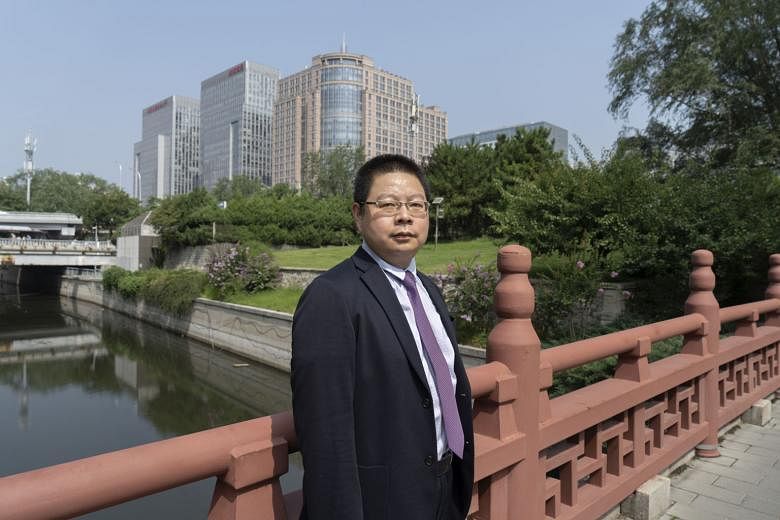HONG KONG • When Associate Professor Tian Feilong first arrived in Hong Kong as demands for free elections were on the rise, he said he felt sympathetic towards a society that seemed to reflect the liberal political ideas he had studied as a graduate student in Beijing.
Then, as the calls escalated into protests across Hong Kong in 2014, he increasingly embraced Chinese warnings that freedom could go too far, threatening national unity.
He became an ardent critic of the demonstrations, and six years later he is a staunch defender of the sweeping national security law that China has imposed on the former British colony.
Prof Tian is among the many Chinese scholars who have turned against Western-inspired ideas that once flowed in China's universities, instead promoting the authoritarian worldview ascendant under China's President and Communist Party leader Xi Jinping.
These Chinese intellectuals serve as champions, even official advisers, defending and honing the party's hardening policies, including the rollout of the security law in Hong Kong.
"Back when I was weak, I had to totally play by your rules. Now I'm strong and have confidence, so why can't I lay down my own rules and values and ideas?" Assoc Prof Tian, 37, said in an interview, explaining the prevailing outlook in China.
Witnessing the tumult as a visiting scholar in Hong Kong in 2014, he said, he "rethought the relationship between individual freedom and state authority".
"Hong Kong is, after all, China's Hong Kong. It's up to the Communist Party to clean up this mess."
While the Chinese Communist Party (CCP) has long nurtured legions of academics to defend its agenda, these new authoritarian thinkers stand out for their unabashed, often flashily erudite advocacy of one-party rule and assertive sovereignty, and their turn against the liberal ideas that many of them once embraced.
They portray themselves as fortifying China for an era of deepening ideological rivalry. They describe the United States as a dangerous, overreaching shambles, even more so amid the coronavirus pandemic.
They oppose constitutional fetters on party control, arguing that Western-inspired ideas of the rule of law are a dangerous mirage that could hobble the CCP. They argue that China must reclaim its status as a world power, even as a new kind of benign empire displacing the US.
They extol Mr Xi as a historic leader, guiding China through a momentous transformation.
Some of these scholars, at times called "statists", have worked on policy towards Hong Kong, a stubborn enclave for pro-democracy defiance of Beijing.
Their proposals have fed into China's increasingly uncompromising line, including the security law, which has swiftly curbed protests and political debate.
"We ignore these voices at our own risk," said Professor Timothy Cheek, a historian at the University of British Columbia, who helps run Reading The China Dream, a website that translates works by Chinese thinkers. "They give voice to a stream of Chinese political thought that is probably more influential than liberal thought."
As well as citing Mr Xi's speeches, these academics draw on ancient Chinese thinkers who counselled stern rulership, along with Western critics of liberal political traditions.
Traditional Marxism is rarely cited; they are proponents of order, not revolution. Many of them make respectful nods in their papers to Carl Schmitt, the German legal theorist who supplied rightist leaders in the 1930s and the emerging Nazi regime with arguments for extreme executive power in times of crisis, Dr Ryan Mitchell, an assistant professor of law at the Chinese University of Hong Kong, documented in a recent paper.
Professor Fu Hualing, a University of Hong Kong law expert, said of these scholars: "They've provided the reasoning and justification... In a way, it's the Carl Schmitt moment here."
China's ideological landscape was more varied a decade ago, when Prof Tian was a graduate student at Peking University, a traditionally more liberal campus. Censorship was lighter, and universities tolerated guarded discussion of liberal ideas in classrooms.
Many scholars, including Prof Tian's dissertation adviser Zhang Qianfan, argued that Hong Kong, with its robust judicial independence, could inspire similar steps in mainland China.
"I had also been nurtured by liberal scholars," Prof Tian said.
Such ideas have gone into retreat since Mr Xi took power in 2012. He began a drive to discredit ideas like universal human rights, separation of powers and other liberal concepts. Dissenting academics are maligned in the party-run news media and risk professional ruin.
Professor Xu Zhangrun of Beijing's Tsinghua University was detained last month and dismissed from his job after writing a stream of essays condemning the party's direction under Mr Xi.
The education authorities generously fund pro-party scholars for topics such as how to introduce security laws in Hong Kong. Chinese and foreign foundations that once supported less orthodox Chinese scholars have retrenched people because of tightening official curbs.
More than fear and career rewards have driven this resurgence of authoritarian ideas in China.
The global financial crisis of 2007, and the US' floundering response to Covid-19 have reinforced Chinese views that liberal democracies are decaying, while China has prospered, defying predictions of the collapse of one-party rule.
"China is actually also following a path that the US took, seizing opportunities, developing outwards, creating a new world," Prof Tian said. "There is even a fervent hope that we'll overtake the West in another 30 years."
NYTIMES

